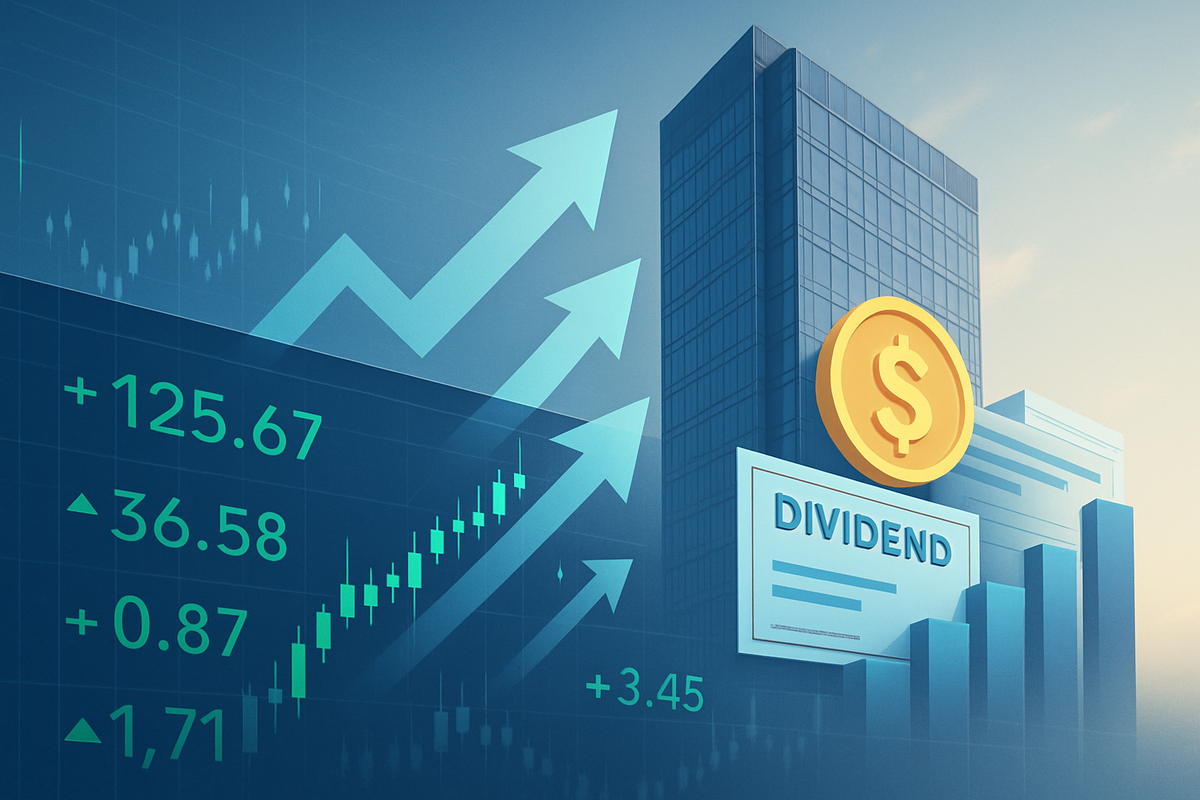Alphabet Enters New Era: First Dividend and $70 Billion Buyback Reshape Tech Landscape

Alphabet Inc. (NASDAQ: GOOGL), the parent company of Google, has ushered in a landmark era for its investors by announcing its first-ever quarterly cash dividend and authorizing a colossal $70 billion share buyback program. This pivotal decision, unveiled alongside robust first-quarter 2024 earnings, signifies a profound shift in the tech giant's financial strategy, balancing aggressive growth investments with direct shareholder returns. The move immediately sent Alphabet's stock soaring, reflecting overwhelming market confidence in its financial strength and future prospects.
This strategic pivot is not merely a gesture but a concrete commitment to enhancing shareholder value. For nearly two decades, Alphabet focused almost exclusively on reinvesting profits to fuel relentless innovation and expansion. The initiation of a dividend, coupled with a substantial share repurchase, signals the company's maturity and its ability to generate significant free cash flow, even amidst massive investments in cutting-edge technologies like artificial intelligence (AI).
A Landmark Shift: What Happened and Why It Matters
On April 25, 2024, Alphabet's Board of Directors approved an initial quarterly cash dividend of $0.20 per share, payable to all Class A, Class B, and Class C shareholders. This dividend was later increased by 5% to $0.21 per share, with the most recent ex-dividend date set for September 8, 2025, and payment on September 15, 2025. Concurrently, the board authorized an additional $70 billion for the repurchase of its Class A and Class C shares, maintaining the significant scale of its existing buyback efforts.
This momentous decision did not occur in a vacuum. For years, Alphabet maintained a policy of reinvesting all profits back into the business, focusing on high-risk, high-reward "moonshot" projects and, more recently, massive investments in AI infrastructure. While dividends were absent, the company did engage in significant share repurchase programs, including a similar $70 billion authorization in the year prior to the dividend announcement. The immediate catalyst was Alphabet's exceptional financial performance in Q1 2024, which saw revenues of $80.5 billion (a 15% increase year-over-year), net income reaching $23.66 billion, and diluted earnings per share (EPS) of $1.89. The company's operating margin expanded to 32%, demonstrating improved operational efficiency, and it commanded substantial cash and marketable securities exceeding $108 billion by March 2024.
The strategic shift was likely influenced by a growing investor appetite for capital returns from mature tech companies, a sentiment potentially heightened by Meta Platforms (NASDAQ: META) initiating its first-ever dividend in February 2024. Key players in this decision include Alphabet CEO Sundar Pichai, who has spearheaded the company's AI-first strategy, and CFO Ruth Porat, instrumental in managing Alphabet's robust financial health. The Board of Directors, responding to both financial strength and shareholder expectations, ultimately approved these measures. The initial market reaction was overwhelmingly positive, with Alphabet's stock surging significantly, adding hundreds of billions to its market capitalization.
A Win-Win for Investors, With Broader Implications
Alphabet's new capital allocation strategy creates clear winners, primarily its shareholders, while also setting a precedent for the broader tech sector.
Existing Shareholders (Long-term Holders) are the most immediate beneficiaries. The $70 billion share buyback program will reduce the number of outstanding shares, thereby boosting earnings per share (EPS) and supporting capital appreciation. Alphabet has a strong track record here, having reduced its share count by 10.9% over the past five years. Additionally, the new quarterly dividend provides a direct cash return, appealing to investors seeking a stable income stream from a blue-chip tech stock. For shareholders who retain their shares, the value increase from buybacks is tax-deferred, making it a tax-efficient method of capital return compared to annually taxed dividends.
Income-Focused Investors and Funds will find Alphabet's stock more attractive. While the initial dividend yield (approximately 0.3% to 0.5%) is modest compared to the S&P 500 average, it opens Alphabet to a new class of investors actively seeking dividend-paying stocks. This could lead to increased demand for Alphabet's shares, diversifying income portfolios that might otherwise be concentrated in traditional dividend sectors. Furthermore, Institutional Investors, many of whom already hold significant stakes, benefit from improved portfolio performance and enhanced appeal to their own income-seeking clients.
The move also creates Indirect Beneficiaries among other mature tech companies. Following Meta Platforms' (NASDAQ: META) lead, Alphabet's dividend could pressure other cash-rich tech giants to re-evaluate their capital allocation strategies, potentially shifting investor expectations across the sector towards balancing growth with direct shareholder returns.
Conversely, while there are few outright "losers," some groups might be Less Impacted or face Indirect Challenges. Pure Growth Investors, who prefer companies to reinvest all profits for aggressive, unbridled expansion, might see the dividend as a slight diversion, although the massive buyback still strongly favors EPS growth. Companies Reliant on Alphabet's Cash for Acquisitions/Investments are theoretically less likely to see large-scale divestitures, as Alphabet is now allocating approximately $10 billion annually to dividends, but given its substantial free cash flow (FGC) ($16.8 billion in Q1 2025 alone) and over $100 billion in cash reserves, this impact is minimal. Finally, Competitors might face an even stronger Alphabet, as its enhanced financial flexibility allows it to both reward shareholders and invest aggressively in innovation, further consolidating its market power.
Industry Impact and Broader Implications: A Shifting Tide in Big Tech
Alphabet's embrace of a dividend and a substantial buyback program marks a significant inflection point, reflecting a broader evolution within the mature technology industry and setting new expectations for capital allocation. This strategy aligns with a growing trend among cash-rich tech companies to return capital to shareholders, moving beyond the historical norm of pure reinvestment for aggressive growth.
This decision positions Alphabet alongside other tech titans that have matured into dividend payers. Companies like Apple (NASDAQ: AAPL) and Microsoft (NASDAQ: MSFT) have long paid dividends, with Microsoft being the largest U.S. company by cash dividends paid, followed by Apple. Even Nvidia (NASDAQ: NVDA) pays a small dividend. Meta Platforms' (NASDAQ: META) recent dividend initiation further solidified this trend, showcasing a shift where "growth stocks" eventually adopt capital return policies as they achieve dominance and sustainable profitability. Only a few major players, such as Amazon (NASDAQ: AMZN), Berkshire Hathaway (NYSE: BRK.A, BRK.B), and Tesla (NASDAQ: TSLA), remain notable holdouts from paying dividends among the top market capitalization stocks.
The ripple effects of Alphabet's move are profound. It could intensify pressure on other cash-rich tech giants to re-evaluate their capital allocation, potentially encouraging more direct returns to shareholders and setting a new benchmark for what constitutes a "blue-chip" tech stock. Simultaneously, Alphabet's aggressive investments in AI infrastructure, with significant capital expenditure increases, intensify the "AI arms race." This compels competitors like Meta Platforms (NASDAQ: META), Amazon (NASDAQ: AMZN) with AWS, and Microsoft (NASDAQ: MSFT) with Azure, who are already heavily invested in AI, to match or exceed Alphabet's pace of innovation and investment to maintain their competitive edge.
From a regulatory standpoint, Alphabet's actions occur amidst ongoing global scrutiny of Big Tech's market dominance, data privacy, and competition. While a recent favorable U.S. court decision eased some antitrust fears regarding Chrome and search, the company still faces ongoing antitrust actions. Stock buybacks themselves have drawn scrutiny, with some concerns they might prioritize short-term stock price boosts over long-term internal investments. However, research suggests that, in aggregate, higher payouts have not necessarily led to a reduction in corporate capital expenditures. Alphabet's robust financial health and continued massive AI investments underscore its ability to manage both.
Historically, tech companies transitioned from pure growth vehicles to balanced growth-and-income plays as their core businesses matured. Microsoft's dividend initiation in 2003 and Apple's in 2012 served as precedents, signaling their evolution into established, cash-generative enterprises. Alphabet is now following this trajectory, solidifying its status as a mature, profitable enterprise capable of both investing heavily in future technologies like AI and consistently rewarding its shareholders.
What Comes Next: Navigating a Future of AI and Shareholder Value
Alphabet's strategic shift marks the beginning of a new chapter, laden with both opportunities and challenges. In the short term, the dividend and ongoing share buyback program are expected to provide a floor for Alphabet's (NASDAQ: GOOGL) stock price, attracting a broader base of investors and enhancing market stability. The buyback's impact on boosting earnings per share (EPS) will continue to positively influence valuations and investor sentiment, which has already seen analysts reiterate "Buy" ratings and raise price targets.
Looking at the long term, Alphabet's trajectory remains heavily centered on maintaining its leadership in Artificial Intelligence (AI) and expanding its cloud computing prowess. The company has substantially increased its capital expenditure (CapEx) guidance for 2025 to $85 billion, primarily allocated to AI infrastructure, data centers, and servers. This commitment underscores its position in the "AI arms race," driving innovation across its segments:
- AI Dominance: AI advancements are improving ad relevancy and user engagement in Google Search, with AI-powered ad tools proving lucrative. Google's Gemini AI models are now embedded across Google Search, YouTube, and Google Cloud, aimed at broadening monetization beyond traditional ads.
- Cloud Growth: Google Cloud continues its rapid ascent, reporting robust revenue growth of 32% year-over-year in Q2 2025, with operating margins doubling to 20%. AI-driven solutions are a cornerstone, attracting enterprise customers seeking advanced cloud solutions.
- Ad Business Resilience: Google's core digital advertising business remains strong, with YouTube's ad revenue showing significant growth.
However, emerging market opportunities and challenges will shape Alphabet's future. While opportunities abound in expanding internet penetration and growing middle classes in regions like India, the company faces intensifying competition in AI and cloud from both local and global players. Regulatory pressures concerning AI ethics, data privacy, and market dominance remain a constant challenge, particularly in the EU and potentially in the U.S.
Potential scenarios include a base case of sustained AI-driven growth, where high CapEx translates into technological leadership and market share gains, with consistent double-digit revenue and operating income growth. An optimistic scenario could see Alphabet achieve significant breakthroughs in AI commercialization, leading to substantial market share gains in Google Cloud and potentially even profitability for its "Other Bets" like Waymo (NASDAQ: WAYMO). Conversely, a pessimistic scenario involves intensifying regulatory headwinds, fierce competition eroding market share, a global economic downturn impacting advertising revenue, and high CapEx failing to yield expected returns.
The broader market impact suggests that Alphabet's move, following Meta's (NASDAQ: META) lead, could influence other mature tech companies to reconsider their capital allocation strategies, potentially shifting investor expectations toward a balance of growth and income generation. Alphabet's recent surge, contributing to it crossing the $3 trillion market capitalization, reinforces the "Magnificent Seven" tech giants as primary engines of market growth, with AI at the forefront.
Conclusion: A New Paradigm for Alphabet and Big Tech
Alphabet's decision to initiate its first-ever dividend and authorize a massive share buyback program marks a pivotal moment, signaling a "new era of capital returns" for its shareholders. This comprehensive strategy, underscored by consistent strong financial performance and a robust cash position, positions Alphabet as a more attractive investment for a broader range of investors, including those who prioritize both income and growth.
Moving forward, the market will likely view Alphabet as a maturing yet still innovative powerhouse, capable of simultaneously investing heavily in transformative technologies like AI and rewarding its long-term shareholders directly. The overwhelming positive market reaction to the announcement, combined with a recent favorable antitrust ruling that cleared significant regulatory overhang, has propelled Alphabet to a $3 trillion market capitalization, cementing its status as a "multidimensional AI powerhouse."
Investors should closely monitor several key areas in the coming months: the pace and effectiveness of AI commercialization and integration across Alphabet's core products; ongoing regulatory developments concerning antitrust and data privacy; the return on substantial capital expenditures in AI infrastructure; the competitive landscape in AI; the trajectory of future dividend growth as a signal of sustained financial health; and broader overall market sentiment and economic indicators. Alphabet's strategic evolution suggests a future where balanced capital allocation, driven by technological leadership and financial strength, will define success in the ever-evolving Big Tech landscape.



